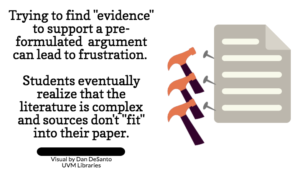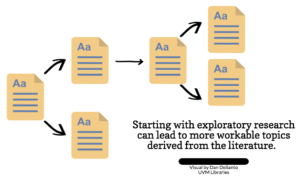Written by guest blogger Trina Magi, UVM Reference & Instruction Librarian
This is the first in an occasional series of posts by UVM Librarians that addresses information literacy and using library resources in teaching.
Students often believe that research begins only after they have chosen a topic. Some even go so far as to write a draft paper before beginning their research.
Deciding on a topic usually feels like a relief to students. But deciding too soon and without first looking at the literature can set students up for later frustration and the feeling that they’re doing something wrong when research turns out to be more difficult than expected. It can also limit students’ learning if they immediately become focused on finding material to prove predetermined points.

Instead, we want students to approach the research process with an attitude of open inquiry that allows them to learn from what the literature has to say1. With some simple but important adjustments to syllabi and assignments, we can help students understand that good research is an iterative process, that attempting to answer a question often leads to more questions, and that a research topic may change over the course of a project.
Consider the following suggestions:
- In your syllabi and assignments, use language that indicates research is an iterative process. Explicitly tell students that you expect their topics may change over the course of a project as they learn more about them.
- Rather than asking students to find literature to prove a point, make assignments that encourage students to approach the literature with an open question. Ask students to notice if there is convergence or dissent around a topic, and allow for the possibility that some (many?) questions may remain unanswered.
- Tell students it’s normal to have feelings of uncertainty and confusion at the beginning of their research process. Invite them to think of themselves as explorers heading out to sea and talk with them about the characteristics and behaviors of good explorers: bravery, curiosity, flexibility, patience and tenacity. Tell them about your experiences with your own research projects.

- Ask students to generate two or three potential topic ideas, and require students to do some exploratory research on each before selecting one. The goal of the exploratory research is to test the viability of each idea and to uncover interesting and previously unknown aspects of the topic. It will also help students determine if an idea requires narrowing or broadening to fit the scope of the paper or project. It doesn’t make sense to attempt a 25-page paper on the confidential marketing strategies of an obscure private company. Conversely, “global warming” is too broad for a short five-page paper.
Librarians can be allies in this process.
Reference and instruction librarians can work with you to create or adjust assignments to encourage exploration and inquiry. Feel free to contact your liaison librarian. Reference and instruction librarians also are accustomed to helping students explore and select topics. Invite your students to meet with a librarian—either at the reference desk or in an individual consultation—to do some exploratory searches in various databases. Librarians also can point students to high-quality topic overviews such as subject-specific encyclopedias and current affairs reports. Browsing these can stimulate ideas and provide clues about the extent of information available about a topic.
1See Association of College and Research Libraries. (2016). “Research as Inquiry,” In Framework for Information Literacy for Higher Education. Retrieved October 9, 2018, from http://www.ala.org/acrl/standards/ilframework#inquiry
